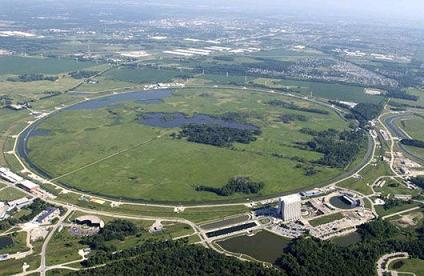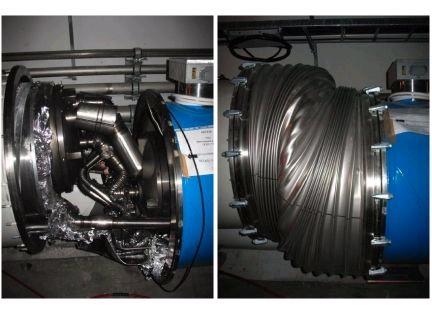By Sheila Lennon Email
this author

Fermilab
The Tevatron at Fermilab in Batavia, Ill.
Race for 'God particle' heats up:
The contenders: The Large
Hadron Collider in
Bern, Switzerland, and the
Tevatron at FermiLab in
Batavia, Ill., 40 miles west of Chicago.
BBC:
Europe's particle physics lab,
Cern, is losing ground rapidly in the race to discover the
elusive Higgs boson, or "God particle", its US rival claims.
The particle, whose existence has been predicted by
theoreticians, would help to explain why matter has mass.
Finding the Higgs is a major goal of Cern's Large Hadron
Collider (LHC).
But the US Fermilab says the odds of its Tevatron
accelerator detecting the famed particle first are now 50-50
at worst, and up to 96% at best.
Both machines hope to see evidence of the Higgs by colliding
sub-atomic matter at very high speeds. If it exists, the
Higgs should emerge from the debris.
The LHC has been out of action
since last September when an accident damaged some of the
magnets that make up its giant colliding ring.

CERN
The damaged magnets
of the Large Hadron Collider.
Project leader Lyn Evans conceded the enforced downtime
might cost the European lab one of the biggest prizes in
physics.
Cern and Fermilab officials
squared up at the American Association for the Advancement
of Science (AAAS) annual meeting in Chicago.
NYT: Officials
Set Timetable for Getting Particle Collider Back on Track.
Sidebar: Alien
life 'may exist among us': BBC.
Never mind Mars, alien life may
be thriving right here on Earth, a major science conference
has heard.
Our planet may harbour forms of "weird life" unrelated to
life as we know it, according to Professor Paul Davies, a
physicist at Arizona State University.
This "shadow life" may be hidden in toxic arsenic lakes or
in boiling deep sea hydrothermal vents, he says.
He has called on scientists to launch a "mission to Earth"
by trawling hostile environments for signs of bio-activity.
Weird life could even be living among us, in forms which we
don't yet recognise, he told the American Association for
the Advancement of Science (AAAS) meeting in Chicago.
"We don't have to go to other planets to find weird life.
"It could be right in front of
our noses - or even in our noses," said the physicist...
Life could be far more common, varied and invisible to us that
we've assumed.
